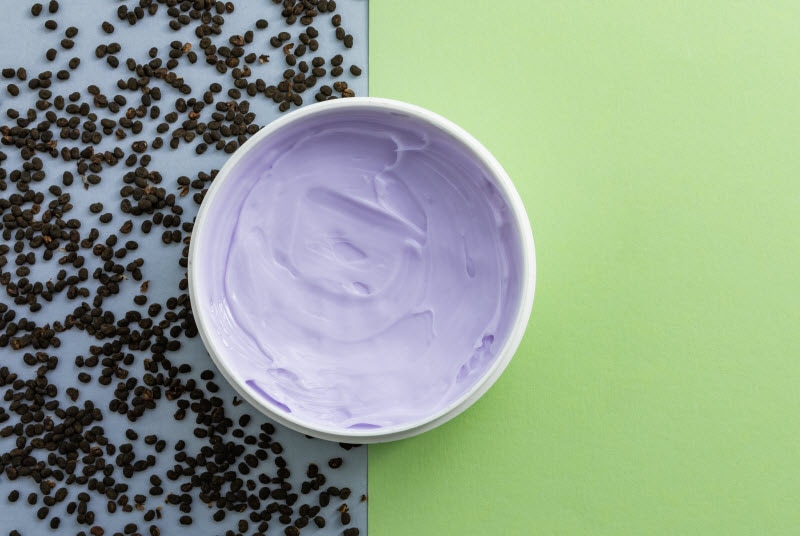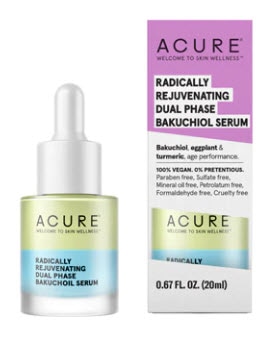Unless an adverse reaction to retinol has pushed you to look for alternatives, you probably haven’t heard of bakuchiol – and not just because it’s hard to pronounce!
Bakuchiol (pronounced buh-COO-chee-ol) is an extract derived from the seeds and leaves of the Psoralea corylifolia plant – or, more commonly known as the babchi plant – which grows mostly in India. While virtually unknown in the West, it’s long been used in traditional Eastern medicine and Ayurvedic practices to address a variety of skin maladies.
But, this fragrant herb is quickly gaining in popularity for its potential to improve skin texture, tone and firmness. For those whose sensitive skin makes retinol a non-starter, bakuchiol is a gentler option that boasts similar benefits!
Bakuchiol benefits for skin
Bakuchiol boasts a host of anti-aging benefits. As well as having antibacterial, antioxidant and anti-inflammatory properties, bakuchiol has been clinically-proven to reverse the signs of aging.†
Bakuchiol offers:
- Boosted cell turnover and regeneration, brightening complexion and firming skin
- Stimulated collagen production, smoothing wrinkles and diminishing fine lines
- Increased hydration, keeping skin moisturized and reducing the appearance of pores
- Decreased hyperpigmentation, smoothing skin tone and texture
- Enhanced anti-acne properties, keeping skin free of breakouts and blemishes
What’s so special about bakuchiol?
Bakuchiol’s list of skincare benefits matches most other retinols, making it powerful, but nothing new. Where this plant extract really stands alone is that:
- It’s naturally-derived
- It’s gentler than retinol
- It’s vegan!
Bakuchiol as a retinol alternative
Topical retinol is one of the most widely-studied ingredients that offers consistent anti-aging benefits. That makes it the reigning champ in skincare! Look around at the best anti-aging skin creams out there and you’ll likely find retinol somewhere in their ingredient list.
However, because this vitamin A derivative is so potent, it can often irritate the skin which limits its uses, especially for those suffering from skin sensitivities.
So, the real question is: how does this newcomer with the weird name stack up against today’s reigning heavyweight champion?
Matching the power of retinoids
The good news for those with skin sensitivities, or those who lead a vegan or all-natural lifestyle, is that bakuchiol actually functions in much the same way as retinoids do.
“Much like a retinol, bakuchiol triggers the genetic pathway in skin cells to create several types of collagen that are useful in skin health and anti-aging,” says Dr. Rachel Nazarian of New York’s Schweiger Dermatology Group.
In fact, one study showed similar results between using retinol and bakuchiol – though, in the study, the bakuchiol group used the cream twice per day to the retinol group’s once per day.
So, while there’s no clear winner here, bakuchiol stands toe-to-toe without giving any ground.
*It’s important to note that while bakuchiol has been shown to work as effectively as over-the-counter retinoids to reduce photoaging, it is not as effective when compared to more powerful prescription retinoids, such as tretinoin.
Neutralizing the drawbacks
While bakuchiol doesn’t win based on benefits alone, it does pull ahead when you start looking at the drawbacks of retinoids.
Retinol can cause redness and soreness, and it can increase skin’s sensitivity to UV rays. For those with sensitive skin, this makes retinoids a no-go. For those with less sensitive skin, it means using a higher SPF face cream, and taking a lot more care on the days you do use retinol.
However, bakuchiol is much more gentle on the skin and doesn’t cause these side effects.
Dr. Nazarian also mentions that bakuchiol does not decrease the skin’s oil glands, so there won’t be persistent dryness or unruly irritation – making it a great hydrator that locks in moisture while working the rest of its anti-aging magic!
How to use bakuchiol
Bakuchiol typically comes in its refined form in skincare products such as creams and serums. Bakuchiol should be applied twice daily – morning and night – after cleansing, and before your daily/nightly moisturizer.
- Step 1: Cleanse
- Step 2: Pat your face dry
- Step 3: Apply bakuchiol oil or product
- Step 5: Allow a few minutes for bakuchiol to ‘sink in’
- Step 4: Apply your daily/nightly moisturizer
And voila! Bakuchiol is refreshing and rejuvenating your skin as you go about your day – and helping you achieve an even deeper beauty sleep!
*Be sure to do a patch test on your skin before you apply bakuchiol or bakuchiol products
**Avoid using bakuchiol with glycolic acid as it could diminish its potency
How long before I notice results from bakuchiol?
Like most beauty products, it’s important to be patient as you commit to using them before you expect any noticeable results. Give bakuchiol a go for at least three months, and decide for yourself if it’s worth the hype!
†These statements have not been approved by the Food and Drug Administration. These products are not intended to diagnose, treat, cure or prevent disease.
Featured product:
Acure Radically Rejuvenating Dual Phase Bakuchiol Serum


